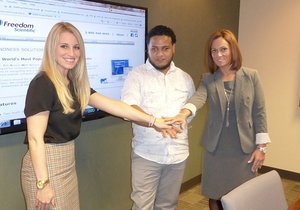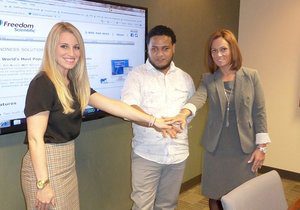

Creating and maintaining a culture of diversity and inclusion remains a top priority for HR professionals and their organisations. Over the years the categories under the umbrella of diversity have expanded from race, religion and ethnicity to include, for example, age, sexual orientation and disability. An area of diversity that continues to develop and mature concerns the employment, inclusion and retention of individuals with disabilities in the workplace.
HR professionals typically lead the diversity charge for their organisations. They have long recognised the strategic value of building collaborative partnerships within the profession, their organisations and the larger community to enhance their diversity efforts. Facilitating and an nurturing these partnerships has become increasingly important HR responsibility. Perhaps one of the best kept secrets for HR is the value added benefit of creating partnerships with Vocational Rehabilitation Counselors (VRCs). Synergistic outcomes can be realised when VRCs and HR professionals work together to advocate for the employment, inclusion, and retention of individuals with disabilities in the workplace.
Employment
HR professionals seek individuals with disabilities as part of a talented applicant pool. VRCs have access to local, state and national networks of qualified applicants with disabilities who are ready to work and the resources to support the employment process. VRCs stand ready to work with HR and other hiring managers to understand their specific employment needs. In addition, they are skilled in career assessment, career planning and vocational counselling to assist employers in finding the right people for the right positions.
Inclusion and Retention
An integral part of inclusion is training on diversity topics that go beyond mere compliance. VRCs can provide information on disability etiquette, customised resources and supports, available financial incentives, and an inclusion perspective on disability-related legislation.
HR professionals handle the complexities associated with employees who acquire disabilities during employment. VRCs are skilled in job analysis, job coaching, and job modification. Working in tandem with the HR professional, VRCs can help design alternative ways for performing what might have been routine tasks. From simple low-cost solutions to harnessing the advances in Assistive Technology, together HR and VRCs can help retain valued employees.
Resources
Society for Human Resource Management (SHRM) - Disability Employment Resources: Some of the resources that can be accessed include toolkits, success stories and resources on accommodations, posters, and specific ways for employers to get involved in the employment, inclusion, and retention of individuals with disabilities. SHRM is also part of a US program entitled What Can You Do? – The Campaign for Disability Employment. This campaign “is a collaborative effort to promote positive employment outcomes for people with disabilities by encouraging employers and others to recognise the value and talent they bring to the workplace”. (http://www.whatcanyoudocampaign.org/)
The National Employment Team (The NET): The NET consists of vocational rehabilitation/business professionals from over 80 public vocational rehabilitation programs across the United States. This resource has a pool of qualified applicants along with a US-wide system for sharing resources and evidence based practices. What is particularly useful to the HR professional is that services are also available at the state and local levels free of cost to the employer. HR professionals can connect with a local VRC through The NET. (http://rehabnetwork.org/)
The National Organization on Disability (NOD): The NOD website includes a resource section for business that includes a Disability Employment Tracker that enables companies to “measure your company's employment practices and discover leading practices and industry trends”, webinars related to disability employment topics and disability employment survey research findings. In addition, consultation is available for individualised planning related to disability. (http://www.nod.org/)
The US Department of Labor, Office of Disability Employment Policy (ODEP): ODEP's mission is “to develop and influence policies and practices that increase the number and quality of employment opportunities for people with disabilities”. ODEP sponsors five research and technical assistance resources including the Job Accommodation Network (JAN), a recognised source of information on workplace accommodations and disability employment technical assistance. (http://www.dol.gov/odep/)
Navigating through the maze of legislation, policies and practices can be a daunting task. HR professionals don’t have to go it alone, however. According to Kathy West-Evans, Director of Business Relations and founder, The NET, “The National Employment Team was developed with business partners and we work with customers across the country. The NET delivers talent and support services to businesses through a network of VR experts working as business consultants in every US state, the territories and the District of Columbia. Serving over one million customers with disabilities annually, the NET/VR is connected to the largest talent pool of candidates with disabilities in the country”.




